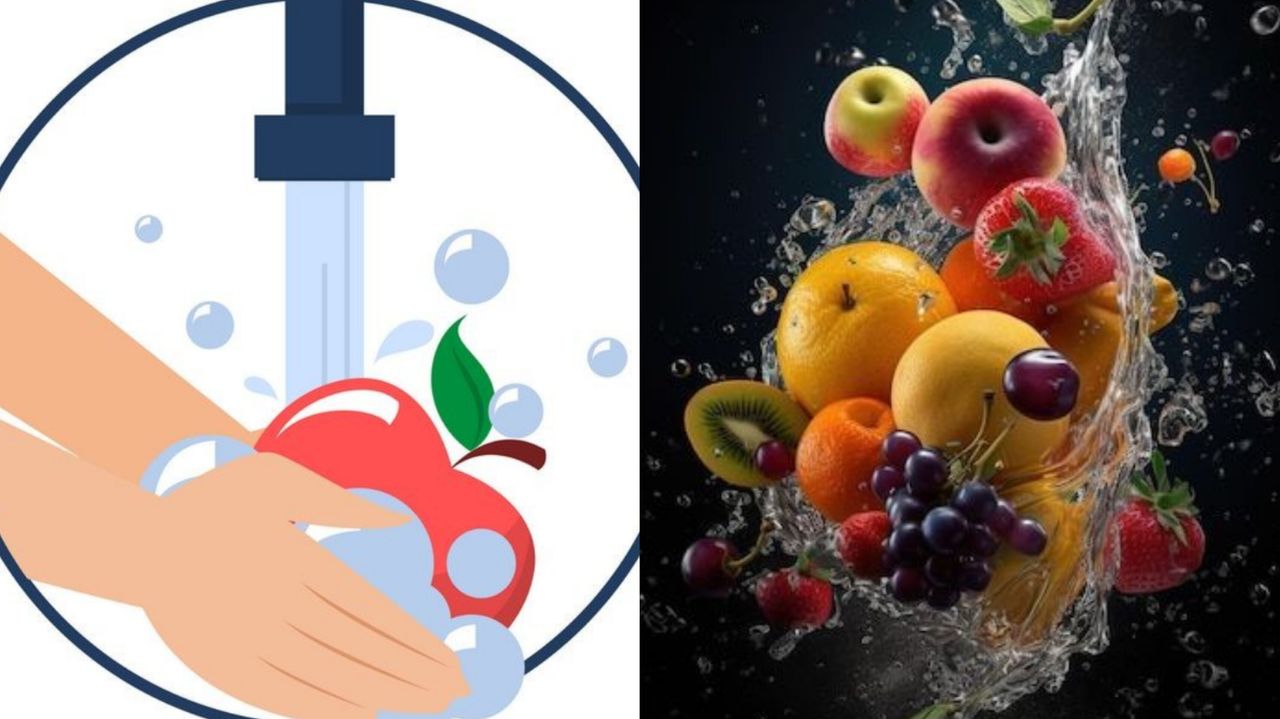Every week, millions in the UK pick-up everyday staples from bread, fruits, to vegetables which they trust are safe to eat. Recent studies have found...
Vous n'êtes pas connecté
- English
- Français
- عربي
- Español
- Deutsch
- Português
- русский язык
- Català
- Italiano
- Nederlands, Vlaams
- Norsk
- فارسی
- বাংলা
- اردو
- Azərbaycan dili
- Bahasa Indonesia
- Հայերեն
- Ελληνικά
- Bosanski jezik
- українська мова
- Íslenska
- Türkmen, Түркмен
- Türkçe
- Shqip
- Eesti keel
- magyar
- Қазақ тілі
- Kalaallisut ; kalaallit oqaasii
- Lietuvių kalba
- Latviešu valoda
- македонски јазик
- Монгол
- Bahasa Melayu ; بهاس ملايو
- ဗမာစာ
- Slovenščina
- тоҷикӣ ; toğikī ; تاجیکی
- ไทย
- O'zbek ; Ўзбек ; أۇزبېك
- Tiếng Việt
- ភាសាខ្មែរ
- རྫོང་ཁ
- Soomaaliga ; af Soomaali
 Maroc - POPDIARIES.COM - A La Une - 12/08/2024 04:50
Maroc - POPDIARIES.COM - A La Une - 12/08/2024 04:50
Why Washing Fruits Alone Won’t Eliminate Pesticides
Washing fruits is a common practice that many people use to ensure they are consuming clean and safe produce. While washing fruits can help remove dirt, bacteria, and some surface residues, it is not always effective in eliminating pesticides. Here’s an in-depth look at why washing alone may not fully remove pesticide residues from fruits: 1. Nature of Pesticides Pesticides are chemicals used to protect crops from pests, diseases, and weeds. They are designed to be persistent and to remain on the produce to ensure effectiveness throughout the growth period. Pesticides can be categorized into different types: - Systemic Pesticides: These are absorbed by the plant and become integrated into its tissues. Washing the surface of such fruits will not remove these pesticides because they are within the fruit itself.- Contact Pesticides: These are applied to the surface of the fruit and can be removed to some extent by washing. However, they may still leave residues that are not fully eliminated through washing. 2. Types of Residues Pesticides can leave different types of residues on fruits: Surface Residues: These are present on the outer layer of the fruit and are somewhat removable by washing. Penetrated Residues:Some pesticides can penetrate into the fruit’s skin or peel. These residues are not easily removed by washing, as they are inside the fruit’s tissue 3. Ineffectiveness of Water Alone Using plain water to wash fruits is often insufficient for several reasons: - Chemical Nature: Pesticides are chemical compounds that may not dissolve easily in water. Simple rinsing with water may not effectively break down or wash away these chemicals.- Hydrophobic Pesticides: Some pesticides are hydrophobic (water-repelling), which makes them difficult to remove with water alone. 4. Washing Techniques and Tools Different washing techniques and tools can influence the effectiveness of pesticide removal: - Running Water: Rinsing fruits under running water is more effective than soaking but may still leave residues, especially if the fruit has been treated with systemic pesticides.- Brushes and Scrubber: Using brushes or scrubbers can help remove surface residues, particularly on fruits with thicker skins or peels. However, these tools may not address residues that have penetrated the fruit.- Specialized Washes: Commercial fruit and vegetable washes are formulated to break down pesticide residues more effectively than water alone. They can help reduce residues, but they still may not remove all types of pesticides, especially systemic ones. 5. Food Processing and Handling The way fruits are processed and handled can also affect pesticide residues: - Peeling: Peeling fruits can remove residues that are on or just below the surface. However, this might not be feasible for all fruits and may lead to loss of nutrients.- Cooking: Cooking fruits, when applicable, can reduce pesticide residues. However, this is not always a practical solution and may affect the texture and taste of the fruit. 6. Regulations and Testing Government regulations and testing standards for pesticide residues help ensure that produce is safe for consumption: - Regulatory Limits: Governments set maximum residue limits (MRLs) for pesticides to ensure they are within safe levels. Produce is tested to ensure compliance with these standards.- Washing Guidance: Guidelines are provided for consumers on how to wash fruits and vegetables effectively, but they often emphasize that washing alone cannot guarantee complete removal of pesticides. 7. Best Practices for Minimizing Exposure To minimize pesticide exposure, consider these practices: - Buying Organic: Organic fruits and vegetables are grown without synthetic pesticides, which can reduce exposure to pesticide residues.- Peeling and Cooking: When practical, peeling fruits and cooking can help reduce pesticide residues.- Diversifying Diet: Eating a variety of fruits and vegetables can help minimize the risk of exposure to any single pesticide. CONCLUSION - while washing fruits is an important step in cleaning produce, it is not a comprehensive solution for removing all pesticide residues. The nature of pesticides, their penetration into the fruit, and the limitations of washing methods mean that additional practices, such as peeling, cooking, or choosing organic produce, may be necessary to further reduce pesticide exposure. READ MORE - The Berlin Olympics Controversy: Hitler’s Neglect of Jesse Owens
Articles similaires
Danish fruit and vegetables largely free of pesticide residues
Most Danish fruit and vegetables are free of pesticide residues, according to the Danish Veterinary and Food Administration. The agency tested more...
Smallholder Farms Maintain Strong Pollinator Diversity – Even When Far From Forests
Industrial farming landscapes often have shortages of pollinators, which can cause production limitations for produce that needs them – and often...
Sardine-inspired washing machine filter removes 99% of microplastics
Fish gills may inspire an unexpected solution to one of our biggest sources of microplastics. According to researchers at Germany’s University of...
Sardine-inspired washing machine filter removes 99% of microplastics
Fish gills may inspire an unexpected solution to one of our biggest sources of microplastics. According to researchers at Germany’s University of...
Invisible Indoor Threats: Emerging Household Contaminants And Their Growing Risks To Human Health
Indoor dust, air and everyday products are exposing people to a growing mix of “new contaminants” inside homes, schools and workplaces, according...
Paediatrician on safe toy choices this Christmas
BAVINA SOOKDEO Christmas is a season of gift-giving and while it often brings shopping, excitement and holiday bustle, it should also come with the...
Why Everyone Can’t Stop Loving These Non-Stick Air Fryer Essentials!
Have you ever wondered why some kitchen gadgets become instant favorites? Well, let us spill the beans… it’s all about convenience, efficiency,...
Why Everyone Can’t Stop Loving These Non-Stick Air Fryer Essentials!
Have you ever wondered why some kitchen gadgets become instant favorites? Well, let us spill the beans… it’s all about convenience, efficiency,...
Digital Power For A Secure Malaysian Food Supply – OpEd
As Malaysia continues to confront rising food prices, unpredictable weather, and global supply disruptions, the discussion on food security often...
أحدث الإصدارات
-
Lupin Unveils Strategic Partnership Program to Expand Reach of its Long-Acting Injectable Platform
Lupin Limited - 09/10/2025
-
BarrierBreak Recognized in 2025 Gartner® Market Guide for Digital Accessibility
BarrierBreak - 12/08/2025
-
Infinite Uptime Unlocks Production Reliability for Heavy Industries with PlantOS™ at Global Steel Dynamics Forum
Infinite Uptime - 18/06/2025
-
Majra – National CSR Fund Honours Top 20 CSR Projects At Inaugural Sustainable Impact Challenge 2025
National CSR Fund - 05/06/2025
-
Coal Imports During FY 2024-25 Drops by 7.9 % Compared to FY 2023-24
Ministry of Coal - 27/05/2025
-
India Records USD 81.04 Billion FDI Inflow in FY 2024–25
Ministry of Commerce and Industry - 27/05/2025
-
Government Restores RoDTEP Benefits for AA, SEZ, and EOU Exports
Ministry of Commerce and Industry - 27/05/2025
-
Aatmanirbhar Bharat: Raksha Mantri approves Advanced Medium Combat Aircraft Programme Execution Model through industry partnership
Ministry of Defence - 27/05/2025
-
Happiest Health Launches Happiest Physio Clinic in Koramangala, Bengaluru
Happiest Health Systems Private Limited - 26/05/2025
-
Shieldworkz Expands OT Cybersecurity Offerings to Tackle Emerging Threats and Posture Management Needs
Shieldworkz - 23/05/2025





